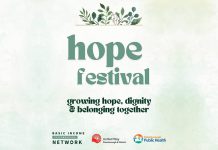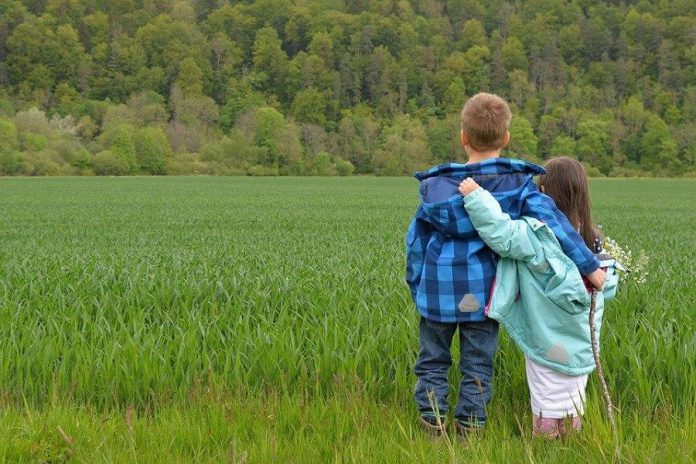
When Dean saw an article in a local paper for foster parent recruitment 10 years ago, he and his wife Andrea discussed the idea and thought it made sense for their family.
The Lindsay couple, who have three biological children, wanted to expand their brood. They had contemplated international adoption but, after seeing the positive fostering experience of a pair of their friends in Toronto, decided they too could foster kids in need.
The chance to be part of a secure and loving family is the most important thing you can offer a child, says Andrea, who left her teaching career to foster full-time.
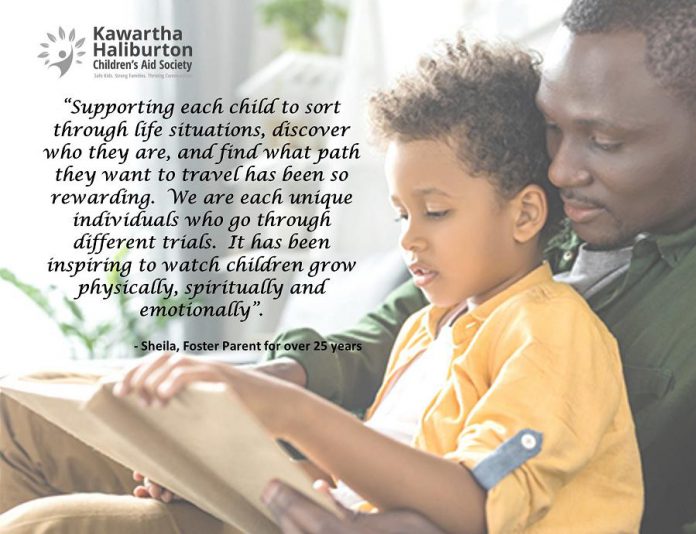
“We have the opportunity to stand alongside families who are struggling and support them as a community,” Andrea explains. “Life is difficult and circumstances have led to different outcomes for many children. If we’re not here for these children, who will be?”
Over a decade, Andrea and Dean have welcomed 10 foster children into their home — some for a few months, others for many years, and a few on an emergency basis and for respite.
They have cared for babies, toddlers, and school-aged children. Some of those children, Andrea points out, had experienced heart-breaking events in their young lives, while others had physical disabilities or emotional or behavioural challenges.
But all of them have equally left an indelible mark on their family, including the couple’s three biological kids. Now teenagers, they have also been very involved in the lives of the foster children placed in their home.
“It has been a gift to see our children develop empathy and embrace others,” Andrea says. “These experiences have shaped my children into caring individuals, who now see that family can look different and still be a place of love and acceptance.”
Andrea says anyone who is considering fostering should know there will be challenges and unexpected hurdles, but these are balanced by the immense sense of fulfillment by knowing you have changed a child’s future.
“The rewards that can come from giving a child who can’t be with their own family a loving home are above what we ever expected.”
New foster families needed in Peterborough, Lindsay, and Haliburton
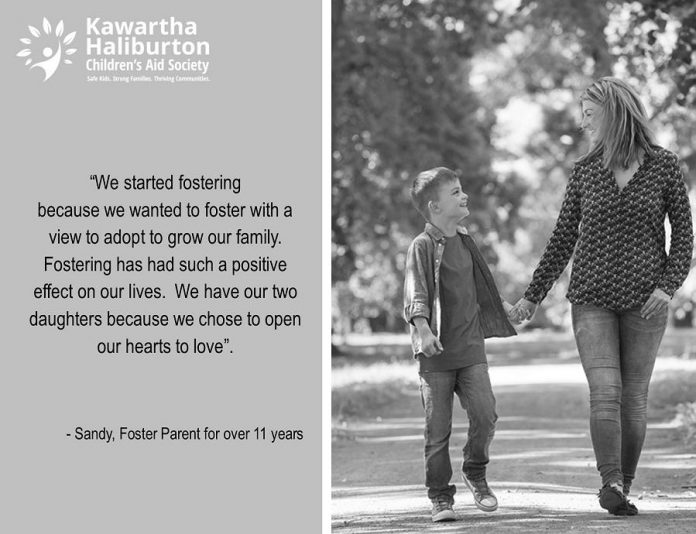
At the heart of Ontario’s foster care system, you’ll find people just like Andrea and Dean, who have stepped up to help children who didn’t choose the situation they’re in and don’t have a place to go when they can’t be with their family.
Children and youth can need foster care for many reasons, when parents and caregivers are facing challenges and working to provide a safe home. Foster placements can be voluntary, or children can be temporarily removed from a home.
Unfortunately, there simply aren’t enough Kawartha-Haliburton foster families available to care for the 193 children and youth that require out-of-home care, according to the Kawartha-Haliburton Children’s Aid Society (KHCAS).
Without local foster families to provide safe and nurturing homes, many children and youth face the prospect of being placed in homes or group homes outside of their communities — leaving them separated from extended family, friends, and all important local community resources that are familiar to them.
That’s why KHCAS launched its “Fostering Changes Futures” recruitment campaign. The agency — which serves Peterborough and Peterborough County, the City of Kawartha Lakes, and Haliburton County — is seeking to identify and train 10 new local foster families who will open their hearts and homes to children until they can be reunited with their biological families.
“Our main goal is to keep families together,” explains Tania Nanni, a resource worker at KHCAS. “We know children do better with their families and when they maintain their community connections, even though they temporarily need to live someplace else.”
Nanni says teens in particular are at greater risk of ending up in placements outside of their communities if they can’t be matched with local foster families. This can leave them separated from family, friends, school, and the community resources they’re familiar with.
Children’s aid societies across Ontario, including KHCAS, are facing a steady decline in available foster families to support infants, young children, teens, and sibling groups who come into their care.
Some previous foster parents have now retired, while others have adopted or obtained custody of the children they were once fostering. Potential new foster parents may be hesitant to apply because they’re not sure if they’re up to the task, especially when it comes to caring for children with complex needs.
All types of families can be foster families
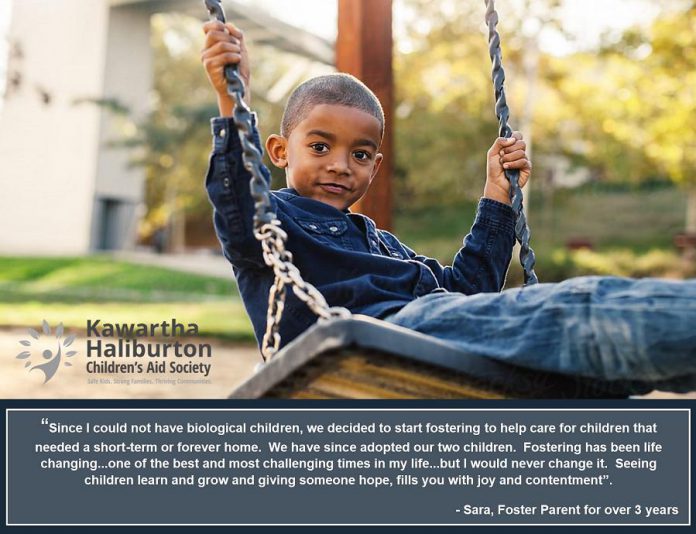
KHCAS is seeking foster families of all cultures and backgrounds, as well as a diverse range of family types, including people who are single or in a relationship, with or without children, employed or retired, and members of the LGBTQ community.
KHCAS is also interested in individuals or families who can take siblings who need to stay together, and those who are able to care for children and youth with complex needs.
An appropriate match between foster families and children needing foster care is crucial to ensure successful fostering, Nanni explains.
“For example, if there’s a child who comes into our care with special needs or who is medically fragile, we’ll work to match that child with a family who already has experience in that area,” she says.
Matches are done by KHCAS resource workers like Nanni and Tanya Hayford, who also provide support to foster parents once the match has been made.
“We don’t know everything about a child and how things are going to go once a match is made,” Hayford points out. “Resource workers help the foster family through those initial days or weeks to make sure that it can be as successful as possible.”
Rebecca Gower, a children’s services worker with KHCAS, offers support services to children while they’re in foster care. She notes foster parents need to be patient, empathetic, flexible, non-judgemental, and willing to learn.
“Patience and understanding are huge given the kids who are coming into care can have complex needs and significant behaviours,” Gower says. “You have to be willing to go above and beyond for these kids.”
Foster families must also be willing to work closely together with both KHCAS and the biological family, Nanni adds. Not only does this help meet a child’s unique needs, but it helps ensure the foster family has the support for a successful fostering experience.
“You’re not an island,” Nanni says. “You have to work with the team.”
Before being approved, prospective foster parents must undergo a thorough screening process, which includes interviews with agency staff, a criminal background check, and an assessment of their home. Applicants must also complete a 27 hour training course.
Once approved, foster parents are assigned a KHCAS resource worker who provides ongoing support. Foster families receive a competitive allowance to cover child expenses, have access to a network of other fosterers for additional support and guidance as well as ongoing training opportunities.
For children who have been exposed to traumatic life events or who have higher needs, KHCAS also supports the foster family by working with other agencies; for example, Therapeutic Family Care, Kinark Child and Family Services, Peterborough Youth Services, and Canopy Support Services.
Interested in fostering? Start the conversation.
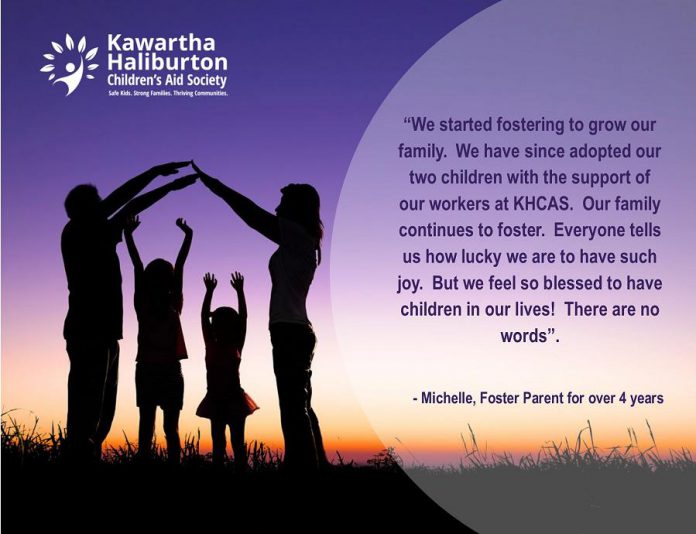
If you are interested in fostering, Nanni suggests making a call to KHCAS to start the conversation and learn more.
“There are many questions you have to think about,” Nanni says. “Together, we’ll decide if fostering is going to work for you and, if so, what’s the best fit.”
As for Lindsay couple Andrea and Dean, they are currently fostering two little ones. Andrea says they hope to inspire people who have the capacity to foster children to take that leap.
“For some of these kids, having a foster parent in the audience at a Christmas concert or at graduation makes a huge difference,” Andrea reflects. “Maybe they’ve never had that one person in their life. It’s the little things that can make a difference for these kids.”
To learn more about becoming a foster parent, please visit the fostering section of the KHCAS website or call toll-free at 1-800 661-2843, ext. 1221. You can also follow KHCAS on Facebook and Twitter.
This story was created in partnership with the Kawartha-Haliburton Children’s Aid Society.





